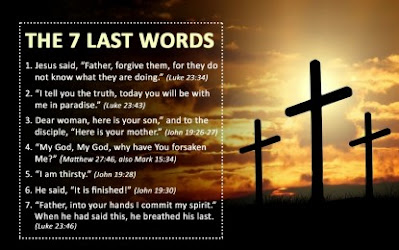Grace, mercy, and peace be to you from God our Father and from our Lord and Savior Jesus Christ! Amen! Dear brothers and sisters in Christ:
“Surely He has borne our griefs and carried our sorrows; yet we esteemed Him stricken, smitten by God, and afflicted. But He was pierced for our transgressions; He was crushed for our iniquities; upon Him was the chastisement that brought us peace, and with His wounds we are healed” (Isaiah 53:4-5).
On Good Friday, we deal with death up close. We stand not beside a casket of a parent, grandparent, child, or another family member; we stand at the foot of the cross of Christ. Tonight, we experience the reality of death, His death. We realize that death does come close. Death comes close to each of us. Death is our enemy.
Death would be cold and dark and empty, except that Jesus has come close to us and has faced death for us. His death changes our experience of death. Now, we stand before His cross and feel the impact of His love for us as He experienced death up close.
We are not immune to death. To live in this fallen world, we must face death. Death can be frightening. Sometimes death invades our lives with blazing speed. Sometimes death is slow and relentless as it stalks its target.
Death comes in many ways, but death still comes. It doesn’t always seem fair. Death can surprise and shock. Death can pierce like a knife. To be human after the Fall is to live a life that is fragile. Death comes close to us. And death would indeed leave us terrorized and empty, except for what took place today nearly 2,000 years ago. We call today Good Friday, because it was this day that Jesus experienced death – for us.
In this evening’s Old Testament lesson from Isaiah, the prophet paints a poetic picture of what Good Friday would be. Isaiah describes the Savior – the Suffering Servant – who would stand in our place and experience death up close. For fallen humanity, death is justice. Death is the verdict that fits the crime. We have disobeyed God’s commands through our thoughts, our speech, and our actions, and thus, we deserve the punishment that fits the crime: death. But for us and for our salvation, the Suffering Servant comes near.
“He was despised and rejected by men, a man of sorrows and acquainted with grief … surely He has borne our griefs and carried our sorrows … He was pierced for our transgressions; He was crushed for our iniquities … the LORD laid on Him the iniquity of us all … He was cut off out of the land of the living … and made His grave with the wicked” (Isaiah 53:3-9).
What a comfort it is that when we face danger, we have the Savior who seeks to come near!
The greatest miracle of Jesus was His Incarnation. It was when God became man – Emmanuel. On Christmas, we rejoice at how much God the Father loves His creation, as God was born in human flesh. But the power of the Incarnation is not just that God became man to join us in this fallen world. No, the power of the Incarnation was so He would also join us in death. Jesus is no distant God, viewing our world from a heavenly palace. No, Jesus comes to be close to the pain. He comes to walk with us in our sorrow. He comes to carry us in our infirmities. He comes to be near to us in all that causes us heartache. He comes to be rejected by His own people as He suffers as an outcast. He comes to face it all with us.
The Suffering Servant knows death up close. He felt the bite of death. He winced at the piercing of the nails through His flesh and bones. He endured the taunting of the crowd and the unjust accusations. He didn’t simply view death from a casual distance. He was no simple spectator. He joined Himself to us and absorbed the blows of the hammer that should have been ours. In His death, He carried our sorrows. He came to the scene of our guilt. He stretched out His hands to receive our sin. He looked death in the eye. He left nothing undone. He said, “Tetelestai”: “It is finished” (John 19:30a). He tasted death. He “bowed His head and gave up His spirit” (John 19:30b). He died.
At the moment of His death, all was accomplished: The obligation paid. He closed the book on our failure. The debt was settled.
Tonight, we stand at the foot of the cross to view Christ the Crucified, our Savior. We experience death up close – the death of our Suffering Servant. But something has changed. In fact, because of Jesus, everything has changed. By grace through faith in Jesus, we can now look into the eyes of death and no longer see a conquering Satan but an enemy who is conquered. We can now see through the eyes of faith. Tonight is a sad day, but tonight is also a great day. Today is Good Friday. Today is the day of salvation! Salvation was won for you on Good Friday!
Through Christ’s death, we can now find hope in sorrow. We have the Suffering Servant who experienced death – for you!
As we experience death, it is great knowing that for those in Christ, you and me, death is not the end, but only serves as the portal to eternal life. Even in our pain and suffering, Jesus is near. In those moments, Jesus is bringing that peace that passes all human understanding. In Jesus Name. Amen.
The peace of God, which surpasses all understanding, keep your hearts and minds in Christ Jesus, our Lord. Amen.
+ SOLI DEO GLORIA +




